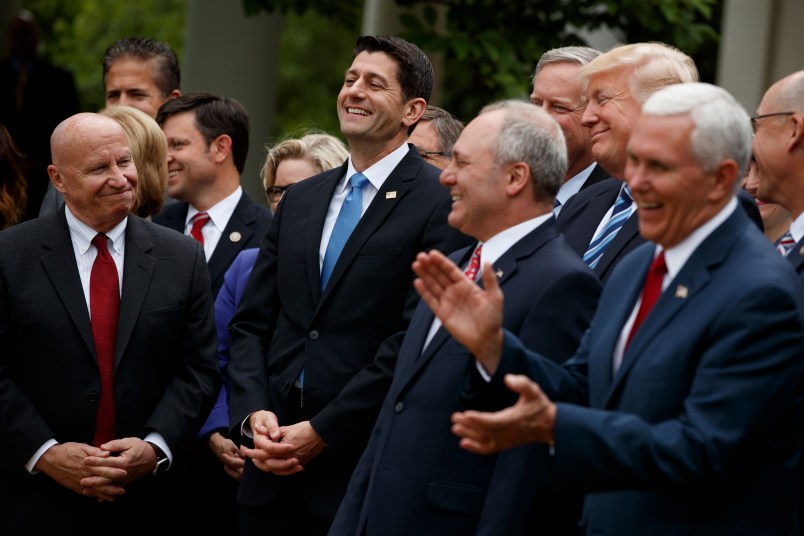Republicans’ almost-passed tax bill could turn their 2018 headache in the suburbs into a migraine.
Their tax plan, which is broadly unpopular with Americans, could prove particularly toxic in the wealthier suburban enclaves that have already become a major worry for Republicans heading into next year’s midterm elections — areas that already have shown major warning signs for the party in recent special elections from Alabama to Virginia to Washington. That’s a huge problem for the party as it looks to hang onto control of the House — a war that will be largely fought in those same suburbs — and hold serve in the Senate.
“It’s a negative for us in every other way than fundraising,” one GOP strategist working on a number of congressional campaigns told TPM. “What’s the reason why some of these upper income districts have historically been with us and have stayed with us even as the party’s moved right on social issues? Taxes. If the Democrats are able to successfully prosecute the case on taxes in those districts against our members, then that’s a scary situation.”
The bill starts off with historically bad poll numbers for a major piece of legislation. Just 33 percent of Americans support the effort while 55 percent oppose it, according to a poll released by CNN on Tuesday. Those numbers were just as bleak in a Monmouth University poll that came out Monday: Just 26 percent of Americans approved of the plan, with 47 percent disapproving of it. Those polls show majorities of Americans think the bill’s changes benefit the wealthy more than the middle class — a true point, looking at most nonpartisan analysis of the bill.
Even Obamacare had about 40 percent approval in most polls when it passed in 2010, with a plurality but not a majority of Americans disapproving of the law, and its passage presaged one of the largest House midterm waves in history.
Those top-line numbers are rough. And while Republicans argue it’ll get more popular as Americans start getting tax cuts next year, the bill’s future is an even starker picture in the districts where House Republican incumbents already appeared the most vulnerable — blue-state suburbs.
That’s where the bill’s new $10,000 cap for deducting state and local income and property taxes will cause tax increases for a number of voters and where high local housing prices mean the plan’s lowering of the maximum rate people can deduct for mortgage interest could significantly deflate local real estate values. Those effects are particularly severe in the wealthier suburbs of states with higher local taxes like New York, New Jersey and California — a potentially toxic mix in areas where once solidly Republican voters have already been fleeing their party in the Donald Trump era.
An analysis of the bill from Moody’s found that 15 of the 30 counties that are worst off under the new bill are in New Jersey. Some of the hardest-hit real estate markets would be in greater New York, Los Angeles, Chicago, D.C. and Minneapolis, where a bevy of Republicans face tough races.
The areas where the bill is the biggest problem could be seen in the GOP defections on the final vote for passage: 11 of the 12 GOP no votes on the bill came from New Jersey (four), New York (five) and California (two).
“It’s not good in my district, it’s not good in New Jersey,” Rep. Frank LoBiondo (R-NJ) told TPM as he exited the House floor after the vote.
Suburban members like Reps. Barbara Comstock (R-VA), Peter Roskam (R-IL) and Ed Royce (R-CA) just handed Democrats another attack line with their yes votes.
But even GOP no votes like LoBiondo and Reps. Darrell Issa (R-CA) might not be able to escape voters’ fury over the bill — as the dozens of Democrats who lost their 2010 reelection fights even after voting against Obamacare can attest.
“I don’t necessarily believe that legislative success translates into electoral success. Just ask the Democrats — they had Obamacare,” Rep. Charlie Dent (R-PA), a suburban moderate who backed the bill and is retiring at the end of his term, told TPM.
LoBiondo’s response when asked if it would hurt him and other suburban Republicans in their reelection even if they voted against the bill: “Time will tell.”
While GOP leaders argue the tax plan will eventually become a political winner once voters find out more about it, even some of the bill’s supporters admit they’re not so sure. Republicans were in a tough spot. The party’s already facing major fundraising woes, and failure to pass the tax plan would have left them without any major legislative accomplishments to run on, while infuriating their donors.
“The only thing worse for them is if the bill fails,” former Rep. Tom Davis (R-VA), a one-time National Republican Congressional Committee chairman, told TPM before the bill passed. “It’s clearly worse if Republicans ended up doing nothing.”
But avoiding the worst-case scenario isn’t exactly the same as a win. And while Democrats are furious about the policy loss, they’re licking their chops about what it means for 2018.







Well, at least there’s some good coming out of this GOP crap-fest.
and 11 months of the Trump ‘presidency’ passed, 37 to go…
I predict there will be many races this close, requiring recounts and more at the local, state and federal level in 2018 - especially in the wealthy suburbs of blue, purple and red states.
Did someome say THEIR CRISIS? LOL!
The GOP isn’t worried, that’s why they rely on corrupt gerrymandering, active voter suppression, and as we saw in 2016, outright stealing elections by working with foreign agents against the United States. It’s a shame it will require Democrats winning by 10% just to actually win by 1%, but for now it’s all we can do.